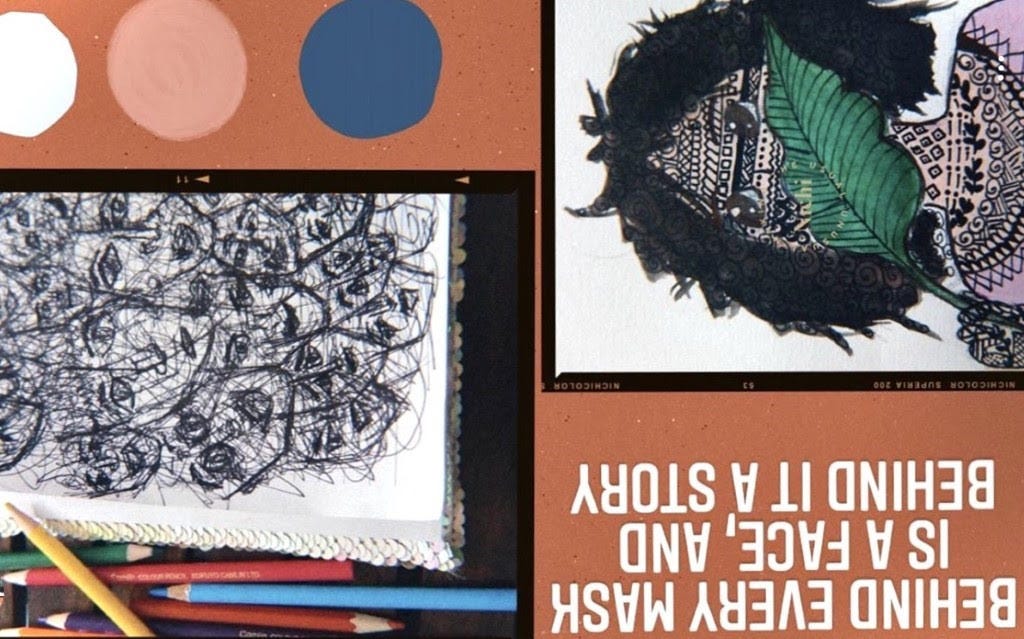Parent’s every word, action, or expression gives the child some message.
My first love expression of the day, in my life as a parent, is cooking. I enjoy its meditative effect.
For me, if cooking does not go well, the rest of the day is ruined. It sways my family’s routines, has the potential to alter my children’s home-schooling schedule, and leaves a speck of invisible guilt dust on my other expressions.
One morning, on busy burners, the pressure cooker’s whistle was spreading the aroma of cooked lentils. I was stirring the curry with one hand, which would be our lunch, and panning the flatbread with my other hand while watching the kettle for the tea to boil.

Bahaar, my teenager, came and showed me a drawing of hers, a girl in pink with glowing skin and a green leaf covering her lips.
“Wow, this is awesome!” I said. Bahaar took her drawing and turned to go back to her room, leaving me confused.
As I turned, my 11-year-old, Nishttha, was coming out of the bathroom with a towel wrapped over her head. I smiled and said, “Good girl! you bathed early today.”
Her eyes snapped over to Bahaar, and she mumbled something. In her eyes, I saw, “You can’t fool me with your flowery words of encouragement.”
In the middle of this pandemic lockdown, I am trying to balance the work-home chaos. And this emotional encounter had the power to push me, a full-time working parent, into a downward spiral of feeling insignificant, potentially negligent, and perhaps even a failure.
I laughed to myself. Wasn’t this my effort to encourage my children?
My inner voice spoke to me, “Yes, I am certain that every child is born limitless, and my role, as a parent, is to nurture their limitlessness.”
My inner voice brought another statement to the surface, which I thought I had forgotten.
“Karam o karo jede bhugat sago.”
My grandfather used to say this Punjabi phrase at almost every turn. This phrase means, “whatever you do, do it only if you can bear its consequences.”
At that time, I did not understand the meaning. But now, I appreciate my grandfather’s wisdom and his desire to develop the capacity of extreme ownership in me.
Being a parent and raising a limitless child is, in effect, an exercise in continually raising oneself and metamorphosing from a likable parent to a confidante.
my experience with praise
A community of parents, grandparents, and siblings raised me. I say this with a lot of gratitude. Their love, care, and acceptance lifted my spirit so that I could embrace trials and triumphs with grace.
I still savor the taste of the milk porridge breakfast that my grandmother used to keep till evening. Many days the milk tasted salty, as it used to get mixed up with my tears from the pain of the hard conversations and nudges throughout the day. She, like the Jedi, policed the extra porridge from a ten-member family as the reward for my everyday perseverance.
The memory of my embroidered dress with extra frills that I wore almost daily still brings a smile. I interpreted my friend’s laughs and smirks as praise for my mom, who designed the dress, especially for my leaner body.
Praise presented life-defining possibilities for me.
If I place all my praise moments over a timeline, I can unambiguously discern the seeds beneath sprouted beliefs, perspectives, and choices.
These seeds make me who I am. These sprouts shaped my parenting mould, an extension of the way I was parented.
It feels like only yesterday when I held Bahaar for the first time. No words can express the feeling of bringing a new life into the world. I found repose in her blabbering, her walking, her talking. Her every step and every fall were occasions to celebrate the trial and courage to try again.
There was no possibility that my praise could go wrong, I thought.
Expanding perspectives of parenting and praise
When Bahaar showed me her drawing, the unconscious parent in me thought praise would work, and declared “Wow! this is awesome.” It was not what Bahaar was looking for. Her creativity and curiosity at the moment needed engagement and stimulation.
While I have been working full time, my parents have been helping me in raising Bahaar and Nishttha. I complained to them often for not celebrating children enough, first with me and now Bahaar and Nishttha.
From the praise lenses that I was wearing, I categorized their daily mundane expressions as mundane and labelled them as the opposite of praise.
I did not recognize that my parents have more experience in parenting. They knew that unchanneled, unconscious praise could make children crave more attention, grow dependent on outside approvals, and smudge their inner eloquence.
The expressions that appeared mundane, like paying attention to unsaid needs, concentrating on feelings, etc., were the conscious teachings beneath the praise to craft the moral fiber.
It was not their methods but my understanding about praise, fixed in my unconscious, which was getting in the way.
While Bahaar’s drawing was gathering dust, my perspective about praise and parenting was expanding. I could see the art beyond the moment, and it was delicate, beautiful, full of feelings.
I was worried about her interests, emotional wellbeing, and developing the capacity to navigate the mirror maze — the maze of self-reflecting, self-distorting, and self-constructing mirrors.
Praise is part of the whole, but it is not the whole picture by itself.
Two weeks later, Bahaar brought her art piece, which developed from the same drawing I thought had been abandoned.

I was amazed by her creativity. Her statement, “Behind every mask is a face, and behind it, a story,” spoke to my heart.
Behind every mask is a face, and behind it, a story
What big myth have I, and probably most of us, been protecting?
Was it that parenting is innate and comes naturally when a child is born?
The kitchen conversation could have been entirely different. It had the power to hold the space for Bahaar’s creativity to emerge. I could have asked,
“Tell me more. “
“What are you trying to paint?”
“What feelings do you want to depict?”
It would have stimulated her exploration, nurtured her critical thinking. Also transformed me from a likable parent to a confidante, with whom my children could explore their’ story of the face behind the mask’ in an un-masked way.
It was an emotional experience for me.
It was like the ambrosial aroma of an inviting recipe, where my parenting experience, my children’s life lessons, praise and encouragement meshed together like the rich colours, unique texture, and patterns that make a tapestry a thing of astonishing beauty.
Like a grain of salt, a parent is an essential spice that dissolves to enhance the flavor of ingredients. Cooking can’t happen without it, and too much salt will ruin the recipe.
Parents and grandparents’ deep values, experiences, and life lessons are like the seasonings, sour and tangy. Only a dash of seasoning can make anyone lick the spoon because it makes the recipe taste personified.
A child might not like the tangy tastes as yet, but the parent knows that this will develop their tiny taste buds to savour the unlimited flavours one day.
Praise and encouragement are the sweet creams and confetti sprinkles. Praise, colorful and celebratory, is an engaging invitation for a cream garnished curry or decorated dessert.
Praise, colourful and celebratory, is an engaging invitation for a cream garnished curry or decorated dessert.
Not the extra sugar that made my evening porridge sweet, but it was a full day of hard work that made it taste like praise. My grandfather’s statement and many such expressions that were tangy like tamarind, peppery like mustard greens, consciously nurtured my story of praise, which is continually expanding now.
It is not a crazy claim to make that raising a child is, in effect, an exercise in continually raising oneself and metamorphosing from a likable parent to a confidante, by
- expanding one’s envelope and live by example,
- letting go of the need to be likable, and
- nurture the child’s capacity.
What is your relationship with the praise?
My invitation for you is to simmer down and cook a new stew with the next generation, using the ingredients of engagement, stimulation, and empowerment — One spicy conversation at a time.
